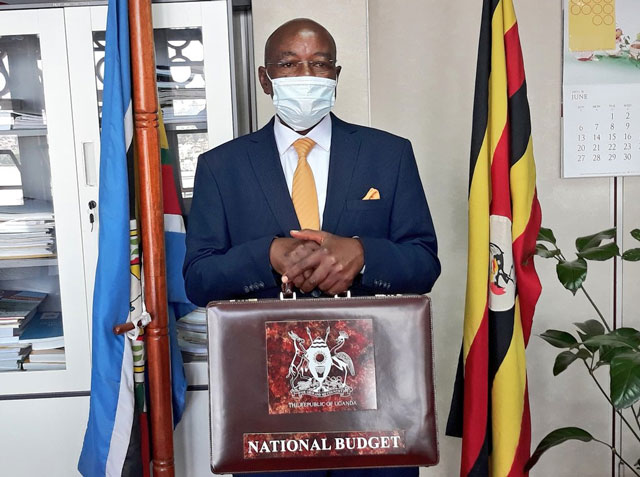The excessive government borrowing from the Central Bank and failure to pay back are the main reasons for the apparent lack of resources for running the government business, the opposition in parliament has noted. This comes at a time when several local governments are reporting shortages in staff salaries for September, and failure to remit local revenues, among other expenditure limitations.
Documents before the Finance Committee of parliament authored by the Minister of State for Finance, Henry Musasizi regarding the underlying circumstances that informed budget cuts to Ministries, Departments, and Agencies (MDAs) in the first quarter of the financial year, 2022/2023 indicate that only 10.25 trillion Shillings out of the 14.57 trillion Shillings that the Ministry was released in the first quarter creating a deficit of 4.3 trillion Shillings.
The first quarter of the financial year runs from July to September. Shillings 5.62 trillion of the 10.25 trillion Shillings released went to debt and interest payment and the remaining Shillings 4.67 trillion was released for discretionary expenditure by MDAs. A breakdown of the released funds shows that 1.603 trillion Shillings catered for wages, 1.813 trillion Shillings for non-wage, 596.7 billion Shillings for the Development budget, and 661.9 billion Shillings for arrears.
There was zero development expenditure release except for the Ministry of Defense, State House, Ministry of Works, and Uganda Revenue Authority -URA equipment. Muhammad Muwanga Kivumbi, the Shadow Minister of Finance, says that the failure by the government to fund statutory expenditures that should have a first call on the budget is a cause of concern to the government’s ability to fund its affairs.
“Accounting officers for Wakiso and Sironko districts have urged their officers to utilize their resources sparingly due to lack of releases for September salaries. This is an indication that government is challenged in funding statutory expenditures,” said the Butambala County MP. He also argues that local revenues are yet to be remitted to Local Governments despite a September 2021 motion for a resolution of Parliament that urged the government to reverse the directive requiring local governments to remit all local revenues to the Consolidated Fund.
The MP says that apart from being in contempt of parliament, this government action has adversely affected the delivery of public services waste management, construction and maintenance of water sources, and education and health facilities, among others.
Bank of Uganda Borrowing
The inadequate budget releases have been pegged on the government’s borrowing of 8 trillion Shillings from the Bank of Uganda (BoU) due to revenue constraints. Kivumbi reveals that this exceeded the statutory limit provided for under Section 36 of the Public Finance Management Act, which permits the government to raise a loan from the Central Bank that doesn’t exceed 10 percent of the domestic revenue.
“In the budget of the financial year 2022/2023, 25.78 trillion Shillings was approved as domestic revenue. Hence, the government is only permitted to borrow 2.57 trillion from the Bank of Uganda. The provision further demands that funds should be repaid from URA collections within the financial year in which, it has been borrowed. However, Government has failed to pay back the funds that were borrowed in past Financial years,” the Shadow Minister said.
Before the current financial year started, the government in February 2022 reported having an outstanding advance from the Central Bank of 3.03 trillion Shillings for the last financial year 2021/2022. This in addition to the latest borrowing brings the BoU debt to 11 trillion Shillings. Amidst the inability of the government to pay back advances from the Bank of Uganda, on February 18th, 2022, it signed an Addendum to the Service Level Agreement (SLA) with the Central Bank to include debt provision, which Kivumbi says conflicts with the mandate of the Bank as provided for in the Bank of Uganda Act.
“No wonder, creditors particularly the International Monetary Fund (IMF) have conditioned that before Government repays advances from the Bank of Uganda, there would be no further external financing releases to Uganda. This has compromised the availability of discretional resources for the running of affairs of the Government. Besides, it is uncertain how much revenue URA has collected so far,” he said.
Amidst these queries, Deputy Speaker of Parliament, Thomas Tayebwa tasked the government side on Wednesday to present a well-structured response on the issues in one week, saying that the issues were critical. In his recent statement to the Finance Committee, Minister Musasizi said that the Finance Ministry is cognizant of the impact of the Quarter One releases but borrowing additional resources to bridge the fiscal gap would have adverse social economic consequences.
He said that when the macroeconomic fundamentals improve, the resources will be released as appropriated, taking into consideration the revenue performance. While speaking at the National Budget Conference for the next financial year, Finance Minister, Matia Kasaija reiterated that this financial year’s performance has been affected by shocks they had not foreseen, especially the sharp rise in global inflation that has affected local commodity prices.
Parliament approved a budget of 48.1 trillion Shillings for the financial year 2022/2023 and out of this, 17 trillion Shillings is for interest and debt repayment. The budget was envisaged to be financed through revenue collections of 25.7 trillion Shillings, grants of 2.1 trillion Shillings, and domestic borrowing of 7.1 trillion Shillings.
-URN





